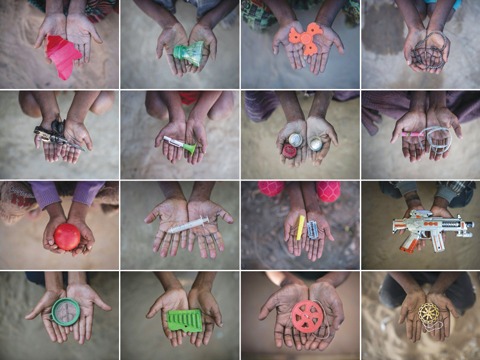Hospitals fill as Rohingya refugees shiver through winter - Survivors testify 'acts of extreme' brutality, attacks
 COX’S BAZAR: This combination of pictures shows Rohingya children holding objects they use as toys to play with in refugee camps in Bangladesh’s Cox’s Bazar. —AFP
COX’S BAZAR: This combination of pictures shows Rohingya children holding objects they use as toys to play with in refugee camps in Bangladesh’s Cox’s Bazar. —AFPGENEVA: Myanmar's security forces may be guilty of genocide against the Rohingya Muslim minority, the United Nations' top human rights official said yesterday, adding that more were fleeing despite an agreement between Myanmar and Bangladesh to send them home. Zeid Ra'ad Al-Hussein, UN High Commissioner for Human Rights, said that none of the 626,000 Rohingya who have fled violence since August should be repatriated to Myanmar unless there was robust monitoring on the ground.
Myanmar's ambassador Htin Lynn said that his government was working with Bangladesh to ensure returns of the displaced in about two months and "there will be no camps". Zeid, who has described the campaign in the past as a "textbook case of ethnic cleansing", was addressing a special session of the UN Human Rights Council called by Bangladesh, which is struggling to accommodate Rohingya who have fled.
He described "concordant reports of acts of appalling barbarity committed against the Rohingya, including deliberately burning people to death inside their homes, murders of children and adults; indiscriminate shooting of fleeing civilians; widespread rapes of women and girls, and the burning and destruction of houses, schools, markets and mosques." "Can anyone - can anyone - rule out that elements of genocide may be present?" he told the 47-member state forum.
The United Nations defines genocide as acts intended to destroy a national, ethnic, racial or religious group in whole or in part. A UN convention requires all countries to act to halt genocide and to punish those responsible. Shahriar Alam, Bangladesh's junior foreign affairs minister, told the session in Geneva that his country was hosting nearly one million "Myanmar nationals" following summary executions and rapes "as a weapon of persecution". Mainly Buddhist Myanmar denies the Muslim Rohingya are its citizens and considers them foreigners. These crimes had been "perpetrated by Myanmar security forces and extremist Buddhist vigilantes", Alam said, calling for an end to what he called "xenophobic rhetoric..including from higher echelons of the government and the military".
Criminal investigations
Zeid urged the Council to recommend that the UN General Assembly establish a new mechanism "to assist individual criminal investigations of those responsible". Prosecutions for the violence and rapes against Rohingya by security forces or by civilians "appear extremely rare", Zeid said. Marzuki Darusman, head of an independent international fact-finding mission on Myanmar, said by video from Malaysia: "We will go where the evidence leads us...Our focus is on facts and circumstances of allegations in Myanmar as a whole since 2011." His team has interviewed Rohingya refugees, including children in the Bangladeshi port city of Cox's Bazar, who recounted "acts of extreme brutality" and "displayed signs of severe trauma".
Refugees shiver
Meanwhile, Bangladesh doctors warned yesterday of a sharp escalation in Rohingya children suffering from pneumonia as hundreds of thousands of refugees shiver through winter in overcrowded camps with little protection from the cold. A sudden cold snap in southeastern Bangladesh has caught refugees off guard in the makeshift Rohingya camps along the border with Myanmar, with aid workers rushing to distribute blankets to families struggling for warmth in their open-sided shanties.
Medics running hospitals and clinics in Cox's Bazar district-where more than 620,000 Rohingya have arrived in the past three months-are reporting huge spikes in ill-equipped refugees falling sick from exposure to the elements. "The number of patients with cold-related illnesses has increased at least five-fold in the last week. Most are children suffering with pneumonia," Zakaria Mahmud, a duty doctor at a local hospital in Teknaf town said.
The hospital was so overcrowded that those awaiting treatment were sleeping on the floors of the wards, Mahmud added. Children were especially vulnerable to the cold, he said, because they did not have proper clothing to ward off the chilly nights. Overnight temperatures in Cox's Bazar had fallen to around 14 degrees (56 Fahrenheit), far from freezing but cold enough to test limits for refugees-particularly children-living in tarpaulin tents on the bare ground, aid workers say. Zafrullah Chowdhury, head of a Bangladeshi medical charity, said the cold threatened to worsen the health of children whose immune systems are depressed. More than half of those to flee violence in Myanmar for Bangladesh since August are children, and many arrived malnourished or suffering from bronchitis or diarrhoea.- Agencies









